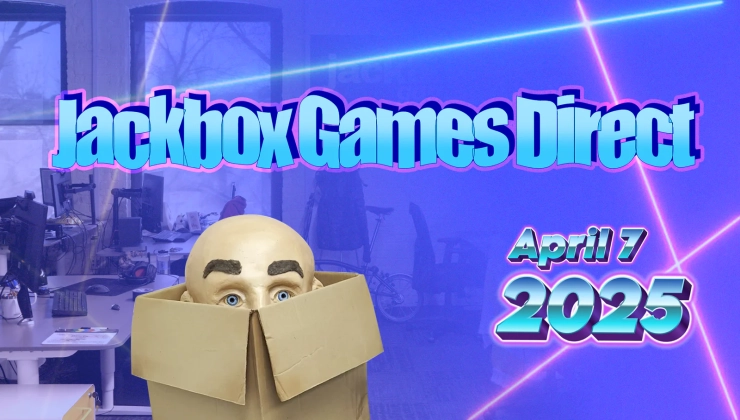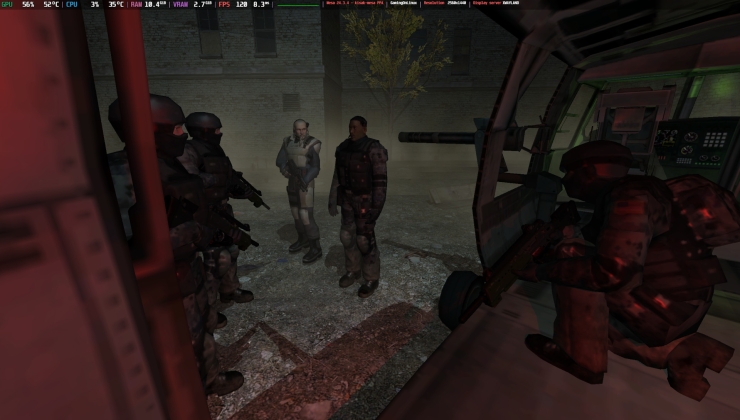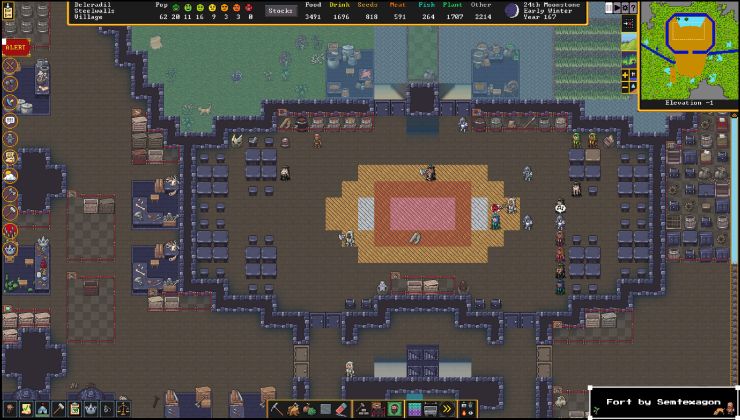I got the chance to have a little chat with Timothee Besset who helped bring us the recent Linux port of Rocket League [Official Site, Steam].
After waiting a while Rocket League finally launched on Linux in Beta form this month. It was fully worth the wait [my article here], but I wanted to speak to one of the main people behind the port itself.
I would like to thank Timothee "TTimo" for taking time out of his busy developer life to answer my questions.
Hopefully you will find this interesting.

GOL: If you don't mind, would you be able to tell us a little about yourself and how you got into programming and porting games?
TTimo: After Loki Software folded in the late nineties, id Software contracted me out to take over maintenance of idTech3 (e.g. Quake III Arena). It was a choice between that and an easy career doing IT for the Oil and Gas industry. So I picked games.
I was the Linux guy at id for several years. Back then it was pretty much just Ryan Gordon and me. I also worked on tools and multiplayer, eventually working as lead programmer on several projects at id.
Then I went back to freelancing. The last few years I've worked in tech for various startups, and I've continued to land game industry work through my contacts.
GOL: This I believe was your first Linux port in quite a long time! How the heck did you land the Rocket League porting job for Linux?
TTimo: Pierre-Loup Griffais at Valve approached me last year to see if I'd be available to help them bring more titles to SteamOS and I said yes!
GOL: I understand that Ryan "Icculus" Gordon also helped with the port, what role did you each play in bringing it to Linux?
TTimo: Ryan has in depth knowledge of Unreal engines (Rocket League is UE3) and had been working on the port for some time already when I took over. He needed to shift his focus to other things so that was a natural transition.

GOL: Was it mostly just the two of you, or were other people involved in the porting process as well?
TTimo: Psyonix had a huge impact on making this port happen and the game releasing at the level of quality that it did. They were there every step of the way to run QA, transfer knowledge about their engine and integrate my work into their release schedule.
GOL: The Linux port was delayed for a long time, care to shed any light on things that tripped it up? There's a lot of people who would be interested in a little history here.
TTimo: I don't know that it was necessarily delayed. The game has a large audience, is multiplayer, is in active development, supports cross platform play .. all these factors mean you have to follow a very controlled process when adding new platforms to the mix.
GOL: Now that the Linux version of Rocket League is available, how do you think the launch went, and how do you feel about the reception to the launch?
TTimo: I think the launch went really well. We rolled out a hotfix last Monday, but there haven't been any major fires.
GOL: Got any more ports lined up? ;)
TTimo: Yes! Although since we are pretty bad at estimating release schedules, I think we'll be a lot more conservative before we mention anything from now on ;-)

GOL: What are your personal thoughts on Valve's SteamOS and Steam Machine effort?
TTimo: I'm biased obviously. It's an ambitious, long term effort - so it's a good fit for Valve!
One key to success is to encourage the adoption of Steam Machines and SteamOS with developers, so they add another platform next to their PS4 and XBox One devkits.
That's where I come in - if you are a developer and you would like to extend your platform reach, but you lack internal resources and knowledge to get started with SteamOS, get in touch we're here to help.
GOL: Any words of wisdom to other developers looking to port their games to Linux? Any interesting lessons learnt from this latest porting effort?
TTimo: It's a very different environment for porting games than it was 6 years ago. I'm still taking it in. Larger developer community, more mature tools and compilers, a lot of great things. What surprised me most is that middleware companies have become a lot more open to Linux. In a lot of cases when they don't offer a Linux SDK officially, chances are they can still give you an unofficial one, which is a great sign for the future of the ecosystem.
Hopefully I will catch up with TTimo again when he does his next secret port, and we will see if his thoughts on anything has changed. It's always fun to see what developers think about Linux porting and especially SteamOS.
If anyone has any ideas on who I should interview, let me know any time.
After waiting a while Rocket League finally launched on Linux in Beta form this month. It was fully worth the wait [my article here], but I wanted to speak to one of the main people behind the port itself.
I would like to thank Timothee "TTimo" for taking time out of his busy developer life to answer my questions.
Hopefully you will find this interesting.

GOL: If you don't mind, would you be able to tell us a little about yourself and how you got into programming and porting games?
TTimo: After Loki Software folded in the late nineties, id Software contracted me out to take over maintenance of idTech3 (e.g. Quake III Arena). It was a choice between that and an easy career doing IT for the Oil and Gas industry. So I picked games.
I was the Linux guy at id for several years. Back then it was pretty much just Ryan Gordon and me. I also worked on tools and multiplayer, eventually working as lead programmer on several projects at id.
Then I went back to freelancing. The last few years I've worked in tech for various startups, and I've continued to land game industry work through my contacts.
GOL: This I believe was your first Linux port in quite a long time! How the heck did you land the Rocket League porting job for Linux?
TTimo: Pierre-Loup Griffais at Valve approached me last year to see if I'd be available to help them bring more titles to SteamOS and I said yes!
GOL: I understand that Ryan "Icculus" Gordon also helped with the port, what role did you each play in bringing it to Linux?
TTimo: Ryan has in depth knowledge of Unreal engines (Rocket League is UE3) and had been working on the port for some time already when I took over. He needed to shift his focus to other things so that was a natural transition.

GOL: Was it mostly just the two of you, or were other people involved in the porting process as well?
TTimo: Psyonix had a huge impact on making this port happen and the game releasing at the level of quality that it did. They were there every step of the way to run QA, transfer knowledge about their engine and integrate my work into their release schedule.
GOL: The Linux port was delayed for a long time, care to shed any light on things that tripped it up? There's a lot of people who would be interested in a little history here.
TTimo: I don't know that it was necessarily delayed. The game has a large audience, is multiplayer, is in active development, supports cross platform play .. all these factors mean you have to follow a very controlled process when adding new platforms to the mix.
GOL: Now that the Linux version of Rocket League is available, how do you think the launch went, and how do you feel about the reception to the launch?
TTimo: I think the launch went really well. We rolled out a hotfix last Monday, but there haven't been any major fires.
GOL: Got any more ports lined up? ;)
TTimo: Yes! Although since we are pretty bad at estimating release schedules, I think we'll be a lot more conservative before we mention anything from now on ;-)

GOL: What are your personal thoughts on Valve's SteamOS and Steam Machine effort?
TTimo: I'm biased obviously. It's an ambitious, long term effort - so it's a good fit for Valve!
One key to success is to encourage the adoption of Steam Machines and SteamOS with developers, so they add another platform next to their PS4 and XBox One devkits.
That's where I come in - if you are a developer and you would like to extend your platform reach, but you lack internal resources and knowledge to get started with SteamOS, get in touch we're here to help.
GOL: Any words of wisdom to other developers looking to port their games to Linux? Any interesting lessons learnt from this latest porting effort?
TTimo: It's a very different environment for porting games than it was 6 years ago. I'm still taking it in. Larger developer community, more mature tools and compilers, a lot of great things. What surprised me most is that middleware companies have become a lot more open to Linux. In a lot of cases when they don't offer a Linux SDK officially, chances are they can still give you an unofficial one, which is a great sign for the future of the ecosystem.
Hopefully I will catch up with TTimo again when he does his next secret port, and we will see if his thoughts on anything has changed. It's always fun to see what developers think about Linux porting and especially SteamOS.
If anyone has any ideas on who I should interview, let me know any time.
Some you may have missed, popular articles from the last month:
All posts need to follow our rules. For users logged in: please hit the Report Flag icon on any post that breaks the rules or contains illegal / harmful content. Guest readers can email us for any issues.
Great Interview.
Nice to see that SteamOS is not dead yet :D
Nice to see that SteamOS is not dead yet :D
10 Likes
Great to heat from TTimo, I was wondering what he'd been up to since leaving id. It's nice to hear about improvements in Linux tools and middleware. Hopefully this situation continues to improve and one day we'll be on par with Windows and consoles.
4 Likes
Thx for the interview. That's the kind of articles I'd like to see more often on GOL.
12 Likes
Great stuff. Thanks Liam, and Timothee of course.
2 Likes
Nice interview, I like to see more interviews like this :)
2 Likes
Good job Liam. Thank you.
Last edited by dubigrasu on 15 Sep 2016 at 5:36 pm UTC
Last edited by dubigrasu on 15 Sep 2016 at 5:36 pm UTC
1 Likes
Yeah really great news that ports are being worked on! :D I think that people misinterpreted Valve's intention 3 years ago when they announced SteamOS... They did not mean to take over the Market with steam machines in 2 years which many people seem to be thinking. What they actually did is make their future as a company independent from third party companies and open a whole new market.
I don't think that SteamOS is was ever meant to be quick revolutionary thing (it was though for us - Linux users :D)
Great interview though! It's nice to hear things from the other side as well and such a positive attitude from developers about the whole SteamOS and linux thing!
I don't think that SteamOS is was ever meant to be quick revolutionary thing (it was though for us - Linux users :D)
Great interview though! It's nice to hear things from the other side as well and such a positive attitude from developers about the whole SteamOS and linux thing!
7 Likes
Liam - Thank you! Very well done!
1 Likes
They did not mean to take over the Market with steam machines in 2 years which many people seem to be thinking.
I believe Valve did actually intend to takeover the market in two years. At least their behaviour was like it: They hyped SteamOS a lot, they announced many different Steam Machines. It all sounded like a "Windows 95" that was supposed to conquer the gaming market, as Gabe Newell did it back then.
However, I believe that at some point, Valve realised it is not possible to go this fast: They didn't enough support from third party game developers and hardware manufacturers. The fact that it was much harder to developer a good Steam Controller than they initially thpught may also have contributed to this.
The lack of hype around the Steam Machine launch was remarkable, and I think at that point Valve knew they couldn't conquer the world by storm.
It's kind of comforting that Timothee Besset states what many of us suspected, Valve still believe in Linux gaming, and are playing the long game. If Valve would have given up, Timothee would know it. This means that the lack of activity on SteamOS is not worrying at all.
The theory that Valve is internally developing on an unstable version of SteamOS and just releases small updates to the stable version is IMO also becoming more plausible.
12 Likes
nice interview : )
0 Likes
@dmantione
This is quite nice argument :) Yeah I think that they just backed up their hype now and are starting to work on it even harder... probably they don't want to remake the same mistake by giving too much hope to users and then disappointing them... They now probably want to make things working before they even announce anything, which in my opinion is exactly what needs to be done! Or maybe they did that big hype few years ago just to show developers and users that they are serious about the project. Maybe if they didn't start so hyped the developers and users would not even consider them seriously... who knows :) I only know that gaming on Linux is becoming greater with every new title and that probably pleases all of us here :D
This is quite nice argument :) Yeah I think that they just backed up their hype now and are starting to work on it even harder... probably they don't want to remake the same mistake by giving too much hope to users and then disappointing them... They now probably want to make things working before they even announce anything, which in my opinion is exactly what needs to be done! Or maybe they did that big hype few years ago just to show developers and users that they are serious about the project. Maybe if they didn't start so hyped the developers and users would not even consider them seriously... who knows :) I only know that gaming on Linux is becoming greater with every new title and that probably pleases all of us here :D
2 Likes
I don't know that it was necessarily delayed.
How could it not be - wasn't originally the SteamOS version promised with the launch of the Steam controller? Then, wasn't it talk about a release around january this year, only to be postponed further?
0 Likes
Great interview! Thank you TTimo for the port and for all the awesome work that you're doing!
0 Likes
They did not mean to take over the Market with steam machines in 2 years which many people seem to be thinking.
I believe Valve did actually intend to takeover the market in two years. At least their behaviour was like it: They hyped SteamOS a lot, they announced many different Steam Machines. It all sounded like a "Windows 95" that was supposed to conquer the gaming market, as Gabe Newell did it back then.
However, I believe that at some point, Valve realised it is not possible to go this fast: They didn't enough support from third party game developers and hardware manufacturers. The fact that it was much harder to developer a good Steam Controller than they initially thpught may also have contributed to this.
The lack of hype around the Steam Machine launch was remarkable, and I think at that point Valve knew they couldn't conquer the world by storm.
It's kind of comforting that Timothee Besset states what many of us suspected, Valve still believe in Linux gaming, and are playing the long game. If Valve would have given up, Timothee would know it. This means that the lack of activity on SteamOS is not worrying at all.
The theory that Valve is internally developing on an unstable version of SteamOS and just releases small updates to the stable version is IMO also becoming more plausible.
I think they had to hype it at first whether they wanted to or not otherwise no one would have shown any interest. Whether they thought they could do it in two years who knows, maybe they did. They did port their whole catalog over pretty quick.
3 Likes
Great Interview.
Nice to see that SteamOS is not dead yet :D
I think it's important to note that TTimo understands that it's going to be a long-term commitment from Valve.
I imagine Valve is going to focus on Big Picture Mode improvements for the SteamOS user interface, and on improvements to SteamOS itself primarily for their product partners (Dell, Falcon, etc.).
If you're expecting SteamOS to be a great option for end-users to install themselves, you're probably thinking about it wrong. It's primary goal, at least for now, is to become a great console.
3 Likes
I think they had to hype it at first whether they wanted to or not otherwise no one would have shown any interest. Whether they thought they could do it in two years who knows, maybe they did. They did port their whole catalog over pretty quick.
Exactly what I'm thinking, it is however nice that Valve is embracing cross-platform gaming, they are of course doing that for their long-term interest but they are being so nice not to lock down ported games to "SteamOS" only so that the whole open-source community can benefit from their efforts. And they really have no reason too since they have been doing very well for quite some time and they are the ones who can conquer the giants that are trying to lock everything to closed environments and make us slaves. Both gaming and computing need freedom in order to achieve innovation and originality. If all the ignorant people (including majority of windows gamers) realised how nice would it be to install free operating system and play all of our favourite games it would be nice... However anyone with common sense should embrace Linux gaming regardless of what they are using at this very moment...
2 Likes
Great interview, thanks!
I'd be interested in an interview with the Linux team at Unity3D. Those guys are doing some great things, and are obviously passionate about Linux!
If anyone has any ideas on who I should interview, let me know any time.
I'd be interested in an interview with the Linux team at Unity3D. Those guys are doing some great things, and are obviously passionate about Linux!
3 Likes
great interview, thanks Liam and TTimo. reading the thoughts of what the companies and devs are going through for the porting process is nice to know. This helps give a better overall picture of how things are going with Linux as a gaming platform.
0 Likes
@dmantione and others:
Check a Dell/Alienware interview from a while back - and remember that Alienware is the only Steam Machine vendor that continues to update their SMs. They openly stated that SteamOS/Steam Machines were used as a lever to show MS that if Windows becomes a walled garden and basically akin to a console ecosystem with high entry barrier, third party developers have an alternative. So far Microsoft is not locking down Windows, so SteamOS is not promoted too much. As soon as MS limits ability to install software outside of Windows Store, Valve will push SteamOS harder.
Of course, to keep that option open they need to update and support SteamOS just enough that at least enthusiasts stick to it and at least some developers publish for SteamOS/Linux. But they won't strongly push Bethesda or CD Project Red to port their stuff to Linux.
Check a Dell/Alienware interview from a while back - and remember that Alienware is the only Steam Machine vendor that continues to update their SMs. They openly stated that SteamOS/Steam Machines were used as a lever to show MS that if Windows becomes a walled garden and basically akin to a console ecosystem with high entry barrier, third party developers have an alternative. So far Microsoft is not locking down Windows, so SteamOS is not promoted too much. As soon as MS limits ability to install software outside of Windows Store, Valve will push SteamOS harder.
Of course, to keep that option open they need to update and support SteamOS just enough that at least enthusiasts stick to it and at least some developers publish for SteamOS/Linux. But they won't strongly push Bethesda or CD Project Red to port their stuff to Linux.
0 Likes
Thanks Liam for the interview, TTimo for bit of hope (for SteamOS) and the rest of you here for interesting points of views.
0 Likes












 How to set, change and reset your SteamOS / Steam Deck desktop sudo password
How to set, change and reset your SteamOS / Steam Deck desktop sudo password How to set up Decky Loader on Steam Deck / SteamOS for easy plugins
How to set up Decky Loader on Steam Deck / SteamOS for easy plugins
See more from me